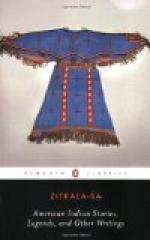Having driven thirty miles to the ferryboat, we crossed the Missouri in the evening. Then riding again a few miles eastward, we stopped before a massive brick building. I looked at it in amazement, and with a vague misgiving, for in our village I had never seen so large a house. Trembling with fear and distrust of the palefaces, my teeth chattering from the chilly ride, I crept noiselessly in my soft moccasins along the narrow hall, keeping very close to the bare wall. I was as frightened and bewildered as the captured young of a wild creature.
THE SCHOOL DAYS OF AN INDIAN GIRL
I.
The land of red apples.
There were eight in our party of bronzed children who were going East with the missionaries. Among us were three young braves, two tall girls, and we three little ones, Judewin, Thowin, and I.
We had been very impatient to start on our journey to the Red Apple Country, which, we were told, lay a little beyond the great circular horizon of the Western prairie. Under a sky of rosy apples we dreamt of roaming as freely and happily as we had chased the cloud shadows on the Dakota plains. We had anticipated much pleasure from a ride on the iron horse, but the throngs of staring palefaces disturbed and troubled us.
On the train, fair women, with tottering babies on each arm, stopped their haste and scrutinized the children of absent mothers. Large men, with heavy bundles in their hands, halted near by, and riveted their glassy blue eyes upon us.
I sank deep into the corner of my seat, for I resented being watched. Directly in front of me, children who were no larger than I hung themselves upon the backs of their seats, with their bold white faces toward me. Sometimes they took their forefingers out of their mouths and pointed at my moccasined feet. Their mothers, instead of reproving such rude curiosity, looked closely at me, and attracted their children’s further notice to my blanket. This embarrassed me, and kept me constantly on the verge of tears.
I sat perfectly still, with my eyes downcast, daring only now and then to shoot long glances around me. Chancing to turn to the window at my side, I was quite breathless upon seeing one familiar object. It was the telegraph pole which strode by at short paces. Very near my mother’s dwelling, along the edge of a road thickly bordered with wild sunflowers, some poles like these had been planted by white men. Often I had stopped, on my way down the road, to hold my ear against the pole, and, hearing its low moaning, I used to wonder what the paleface had done to hurt it. Now I sat watching for each pole that glided by to be the last one.




